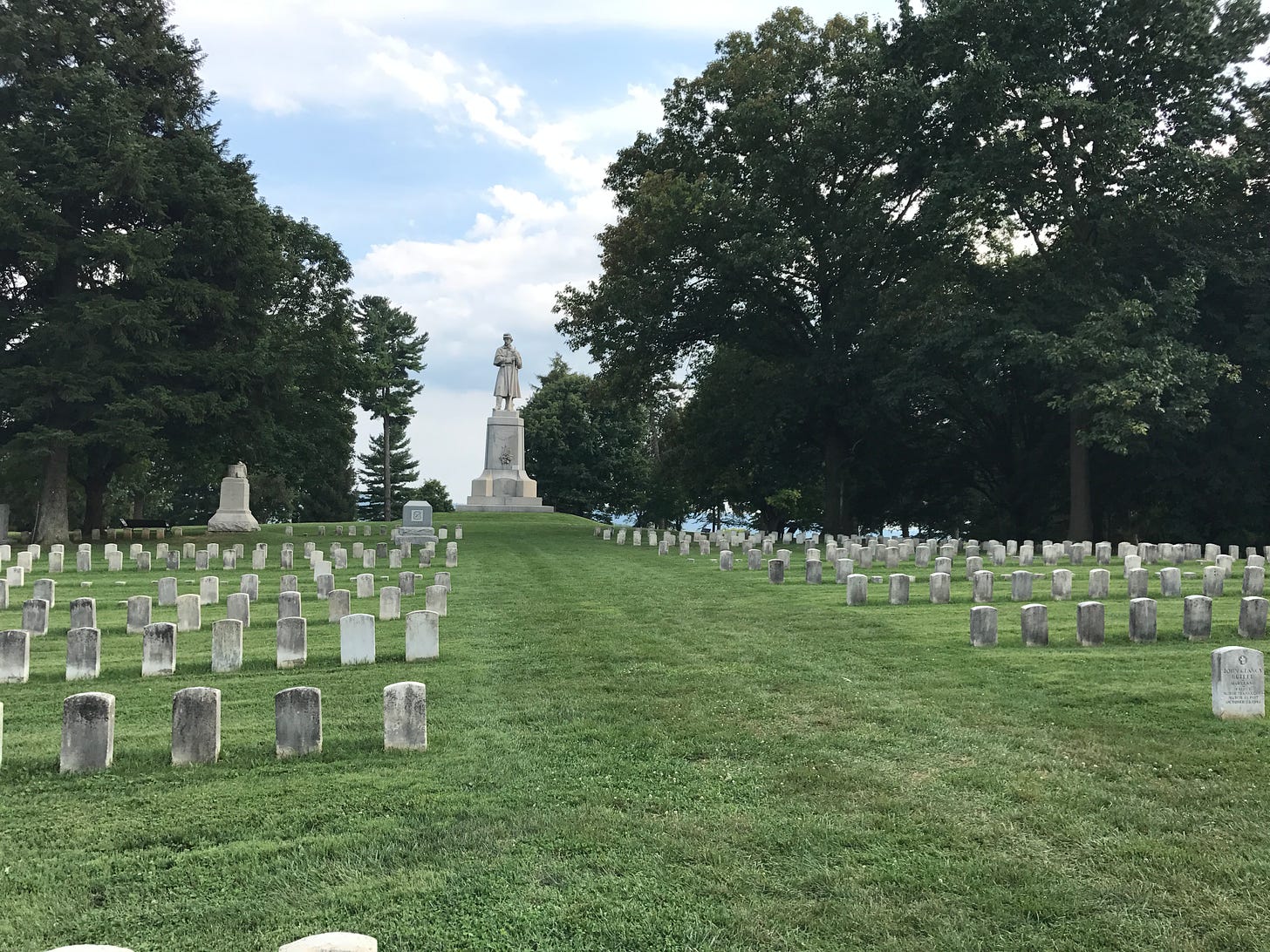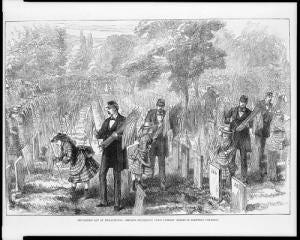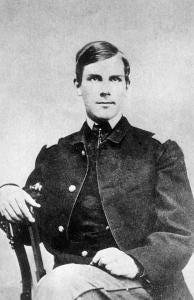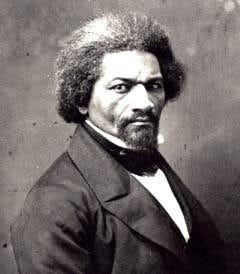Memorial Day 2023: “The Loyal Soldiers who Imperiled all for Country and Freedom are One and Inseparable.”
I detest the overly recreational and commercialized hype of how we Americans “celebrate” Memorial Day. I know that “detest” is a strong word, but I choose it deliberately. Memorial Day should be a time for contemplation and remembering those who have given their last full measure of devotion to our country. I knew and served with many whose mortal remains lie in repose, and there are so many times that it seems that they are with me. But for too many people it means little other than time off from work and take advantage of “specials” offered by stores and restaurants, or a tidbit of a discount for having served in the military.
But Memorial Day is not about us, individually, or collectively. It is about the fallen. Abraham Lincoln summed how we should remember them up in his conclusion of the Gettysburg Address:
“It is rather for us to be here dedicated to the great task remaining before us — that from these honored dead we take increased devotion to that cause for which they gave the last full measure of devotion — that we here highly resolve that these dead shall not have died in vain — that this nation, under God, shall have a new birth of freedom — and that government of the people, by the people, for the people, shall not perish from the earth.”
As we contemplate the importance of Memorial Day and remember the men and women who gave their lives for this country it is important to remember why we do this. We must strive to ensure that the freedoms that our honored dead fought to preserve at home and abroad are not lost because we are too ignorant and self-centered to care. Sadly, the fact of the matter is that a resurgence of White Nationalist racism, and Fascism is endangering the freedoms won at such a high cost.
Memorial Day grew out of local observances following the Civil War, a war that claimed the lives of over 620,000 American Soldiers from the Union and the Confederacy. New demographic studies by historians estimate the losses at closer to 750,000. Hundreds of thousands of other people had they lives shattered by the war, killed, wounded, maimed, crippled, and shattered in mind and spirit, the country in many places devastated by war’s destruction. If we use the 620,000 number as our yardstick, it would have meant that 2.5% of the population of the country died in the war. People needed to make sense of the terrible losses that often wiped out the younger male populations of the small towns and communities from which most of these men, and a some women hailed.
To put this in perspective, if the same percentage of Americans were to die today in such a war, total number of dead would be over seven million people.
The devastating effects of the war reached into every home in some way, and sadly, or perhaps thankfully we have no concept of such losses today. However, if we did really understand, those that praise and advocate for White Nationalist or Fascism might be less flippant and more contemplative before enacting policies and laws that harm other citizens or either supporting or taking part in violence against them and the institutions that guard the rights of all Americans.
In 1868, Major General John Logan who had been an excellent corps commander during the war, was serving as the Commander of the nation’s first true Veterans organization, the Grand Army of the Republic.
After the war, many in the North were quick to forget their veterans and move on to enriching themselves at the expense of fellow citizens, no more so than how they treated veterans.
The G.A.R gave those veterans a place of refuge in a country that was leaving them behind, forgetting their sacrifice in the name of westward expansion and a growing economy.
General Logan issued the Memorial Day Order on May 5th 1868:
HEADQUARTERS GRAND ARMY OF THE REPUBLIC, General Orders No.11, WASHINGTON, D.C., May 5, 1868
The 30th day of May, 1868, is designated for the purpose of strewing with flowers or otherwise decorating the graves of comrades who died in defense of their country during the late rebellion, and whose bodies now lie in almost every city, village, and hamlet church-yard in the land. In this observance no form of ceremony is prescribed, but posts and comrades will in their own way arrange such fitting services and testimonials of respect as circumstances may permit.
We are organized, comrades, as our regulations tell us, for the purpose among other things, “of preserving and strengthening those kind and fraternal feelings which have bound together the soldiers, sailors, and marines who united to suppress the late rebellion.” What can aid more to assure this result than cherishing tenderly the memory of our heroic dead, who made their breasts a barricade between our country and its foes? Their soldier lives were the reveille of freedom to a race in chains, and their deaths the tattoo of rebellious tyranny in arms. We should guard their graves with sacred vigilance. All that the consecrated wealth and taste of the nation can add to their adornment and security is but a fitting tribute to the memory of her slain defenders. Let no wanton foot tread rudely on such hallowed grounds. Let pleasant paths invite the coming and going of reverent visitors and fond mourners. Let no vandalism of avarice or neglect, no ravages of time testify to the present or to the coming generations that we have forgotten as a people the cost of a free and undivided republic.
If our eyes grow dull, other hands slack, and other hearts cold in the solemn trust, ours shall keep it well as long as the light and warmth of life remain to us.
Let us, then, at the time appointed gather around their sacred remains and garland the passionless mounds above them with the choicest flowers of spring-time; let us raise above them the dear old flag they saved from dishonor; let us in this solemn presence renew our pledges to aid and assist those whom they have left among us a sacred charge upon a nation’s gratitude, the soldier’s and sailor’s widow and orphan.
It is the purpose of the Commander-in-Chief to inaugurate this observance with the hope that it will be kept up from year to year, while a survivor of the war remains to honor the memory of his departed comrades. He earnestly desires the public press to lend its friendly aid in bringing to the notice of comrades in all parts of the country in time for simultaneous compliance therewith.
III. Department commanders will use efforts to make this order effective.
By order of
JOHN A. LOGAN, Commander-in-Chief
N.P. CHIPMAN, Adjutant General
Official: WM. T. COLLINS, A.A.G.
General Logan’s order is remarkable in its frankness and the understanding of the war in the immediate context of its conclusion. His understanding that the Union soldiers “liberated a race in chains,” and that their deaths served a tattoo to a “rebellious tyranny in arms” say much about how Union veterans viewed their service.
In 1868 the day would be observed at 183 cemeteries in 27 States and the following year over 300 cemeteries. Michigan was the first state to make the day a holiday and by 1890 all states in the North had made it so. In the South there were similar observances but the meaning attributed to the events and the sacrifices of the Soldiers of both sides was interpreted quite differently. In the North the Veterans overwhelmingly saw themselves as the saviors of the Union and the liberators of the Slaves. In South it was about the sacrifices of Confederate soldiers in what became known as the “Lost Cause.” But in both regions and all states, the surviving Soldiers, family members and communities honored their dead.
Joshua Chamberlain, a hero of Little Round Top at the Battle of Gettysburg showed his anger towards those in the North who demeaned the Union soldiers who fought, died, or like him, were maimed in the war, yet praised the “chivalry” of the rebels.
“Those who can see no good in the soldier of the Union who took upon his breast the blow struck at the Nation’s and only look to our antagonists for examples of heroism—those over magnanimous Christians, who are so anxious to love their enemies that they are willing to hate their friends. . . . I have no patience with the prejudice or the perversity that will not accord justice to the men who have fought and fallen on behalf of us all, but must go round by the way of Fort Pillow, Andersonville and Belle Isle to find a chivalry worthy of praise.”
In 1884 Oliver Wendell Holmes Jr. and Frederick Douglass both spoke about the meaning of the sacrifice made by so many.
Holmes, a veteran of the war who had been wounded at Antietam ended his Decoration Day 1884 speech:
“But grief is not the end of all…Our dead brothers still live for us, and bid us think of life, not death, — of life to which in their youth they lent the passion and glory of the spring. As I listen, the great chorus of life and joy begins again, and amid the awful orchestra of seen and unseen powers and destinies of good and evil our trumpets sound once more a note of daring, hope, and will.”
Lt. Henry Church, who served in the Iron Brigade, was as incensed as Chamberlain. As he wrote to his wife: “Their tongues were very smooth and their promises fair, when they needed men to save the Union. . . . But now that the crisis has passed, and danger no longer apprehended, they think not of us. . . . It makes my blood fairly boil, when I recall the risks we have seen.”
Frederick Douglass, the former slave and abolitionist who lobbied Lincoln for emancipation and to give Blacks the chance to serve their country had two of his sons serve in the war noted the consequences of forgetting why the war was fought:
“Whether the tremendous war so heroically fought . . . shall pass into history a miserable failure . . . or whether on the other hand, we shall, as the rightful reward of victory over treason have a solid nation, entirely delivered from all contradictions and social antagonisms, must be determined one way or another.”
He also spoke these words:
“Dark and sad will be the hour to this nation when it forgets to pay grateful homage to its greatest benefactors. The offering we bring to-day is due alike to the patriot soldiers dead and their noble comrades who still live; for, whether living or dead, whether in time or eternity, the loyal soldiers who imperiled all for country and freedom are one and inseparable.”
While we remember all of our fallen soldiers, marines, sailors, airmen, coastguardsmen, and our new guardians, from every war this weekend, we cannot forget why Memorial Day was established. If we do, we do terrible violence to our nation, people, and democracy. If we do not continue to fight for the “new birth of freedom” that Lincoln so eloquently spoke of at Gettysburg we will lose our freedoms.








